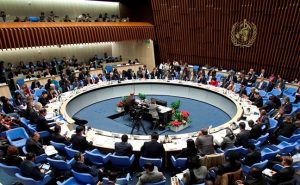Global health leaders play a pivotal role in pandemic preparedness by developing global strategies and coordinating international responses to health crises. Developing global strategies for pandemic preparedness involves creating comprehensive plans that address potential health threats before they escalate into full-blown pandemics. This includes crafting policies, guidelines, and frameworks that can be adopted by countries worldwide to ensure a unified and effective response to emerging health threats. By focusing on prevention, surveillance, and response mechanisms, global health leaders can help mitigate the impact of pandemics on populations and economies.
Coordinating international responses to health crises is another critical responsibility of global health leaders. This involves facilitating collaboration among countries, international organizations, and other stakeholders to ensure a timely and efficient response to health emergencies. By coordinating efforts, global health leaders can help streamline resource allocation, share best practices, and ensure that all countries have access to the necessary tools and support to combat pandemics effectively. This collaborative approach not only strengthens global health systems but also fosters a sense of solidarity and shared responsibility in addressing health crises.
Strategies for International Collaboration

International collaboration is essential for enhancing pandemic preparedness and response. One key strategy is to share data for enhanced pandemic preparedness and response. By sharing data on disease outbreaks, transmission patterns, and public health interventions, countries can gain valuable insights into the dynamics of pandemics and develop more effective strategies to combat them. Data sharing also enables researchers and policymakers to identify trends, assess risks, and make informed decisions that can help prevent the spread of infectious diseases.
Coordinating global health policies for pandemic preparedness is another crucial strategy for international collaboration. This involves aligning national policies with global standards and guidelines to ensure a consistent and effective response to health threats. By working together to develop and implement harmonized policies, countries can create a more resilient global health system that is better equipped to handle pandemics. This coordination also helps to avoid duplication of efforts, optimize resource use, and ensure that all countries are prepared to respond to health emergencies in a timely and efficient manner.
Importance of Early Detection Systems
Early detection systems are vital for boosting pandemic preparedness and response efficiency. Early detection boosts pandemic preparedness and response efficiency by enabling health authorities to identify and respond to outbreaks before they become widespread. This involves implementing robust surveillance systems, investing in diagnostic technologies, and training healthcare workers to recognize and report potential health threats. By detecting outbreaks early, countries can take swift action to contain the spread of infectious diseases, thereby minimizing their impact on public health and economies.
Strengthening global health systems for pandemic preparedness is another important aspect of early detection. This involves building the capacity of health systems to respond to health emergencies by investing in infrastructure, workforce development, and technology. By strengthening health systems, countries can ensure that they have the resources and capabilities needed to detect, respond to, and manage pandemics effectively. This not only improves their ability to handle current health threats but also enhances their preparedness for future pandemics.
Investment in Healthcare Infrastructure
Investing in healthcare infrastructure is essential for strengthening pandemic preparedness. Strengthening healthcare infrastructure for pandemic preparedness involves upgrading facilities, expanding access to healthcare services, and ensuring that healthcare systems are resilient and capable of handling increased demand during health emergencies. This includes building new hospitals, improving existing facilities, and ensuring that healthcare workers have the necessary training and resources to provide high-quality care. By investing in healthcare infrastructure, countries can enhance their capacity to respond to pandemics and protect the health and well-being of their populations.
Investing in technology for enhanced pandemic preparedness is another critical component of healthcare infrastructure investment. This involves adopting advanced technologies such as telemedicine, electronic health records, and diagnostic tools that can improve the efficiency and effectiveness of healthcare delivery. By leveraging technology, countries can enhance their ability to monitor and respond to health threats, improve patient outcomes, and ensure that healthcare systems are better prepared to handle pandemics. This investment in technology not only strengthens healthcare infrastructure but also supports the development of innovative solutions to address emerging health challenges.
Training and Capacity Building

Training and capacity building are crucial for enhancing pandemic preparedness. Enhance pandemic preparedness through targeted training programs by providing healthcare workers, public health professionals, and other stakeholders with the knowledge and skills needed to respond to health emergencies. This includes training on disease surveillance, outbreak investigation, infection control, and emergency response. By equipping individuals with the necessary expertise, countries can ensure that their health systems are better prepared to handle pandemics and protect public health.
Capacity building is crucial for effective pandemic preparedness as it involves strengthening the overall capacity of health systems to respond to health emergencies. This includes investing in workforce development, improving infrastructure, and ensuring that health systems have the resources and capabilities needed to manage pandemics. By building capacity, countries can enhance their ability to detect, respond to, and recover from health emergencies, thereby improving their overall pandemic preparedness and resilience.
Public Communication and Education
Effective public communication enhances pandemic preparedness by ensuring that accurate and timely information is disseminated to the public. This involves developing clear and consistent messaging, using multiple communication channels, and engaging with communities to build trust and promote adherence to public health measures. By keeping the public informed and engaged, countries can enhance their ability to manage pandemics and protect public health.
Education systems must prioritize pandemic preparedness training to ensure that individuals are equipped with the knowledge and skills needed to respond to health emergencies. This includes integrating pandemic preparedness into school curricula, providing training for educators, and developing educational resources that promote awareness and understanding of health threats. By prioritizing pandemic preparedness training, education systems can help build a more informed and resilient population that is better prepared to handle future health emergencies.
Policy Development and Implementation

Policy development and implementation are essential for strengthening global pandemic preparedness. Strengthening global pandemic preparedness involves developing policies that address the unique challenges posed by pandemics and ensuring that these policies are implemented effectively. This includes creating frameworks for surveillance, response, and recovery, as well as establishing mechanisms for coordination and collaboration among countries. By developing and implementing robust policies, countries can enhance their ability to manage pandemics and protect public health.
Coordinating international efforts for pandemic preparedness is another key aspect of policy development and implementation. This involves aligning national policies with global standards and guidelines, facilitating collaboration among countries, and ensuring that resources are allocated efficiently. By coordinating efforts, countries can create a more resilient global health system that is better equipped to handle pandemics. This coordination helps to avoid duplication of efforts, optimize resource use, and ensure that all countries are prepared to respond to health emergencies in a timely and efficient manner.










